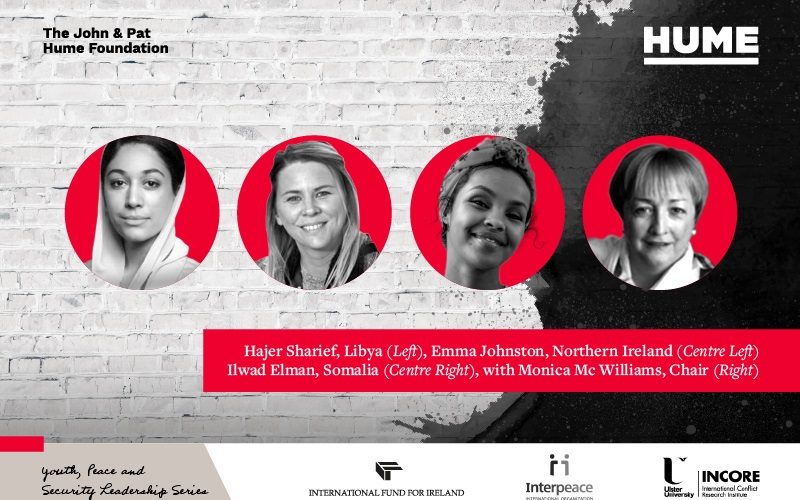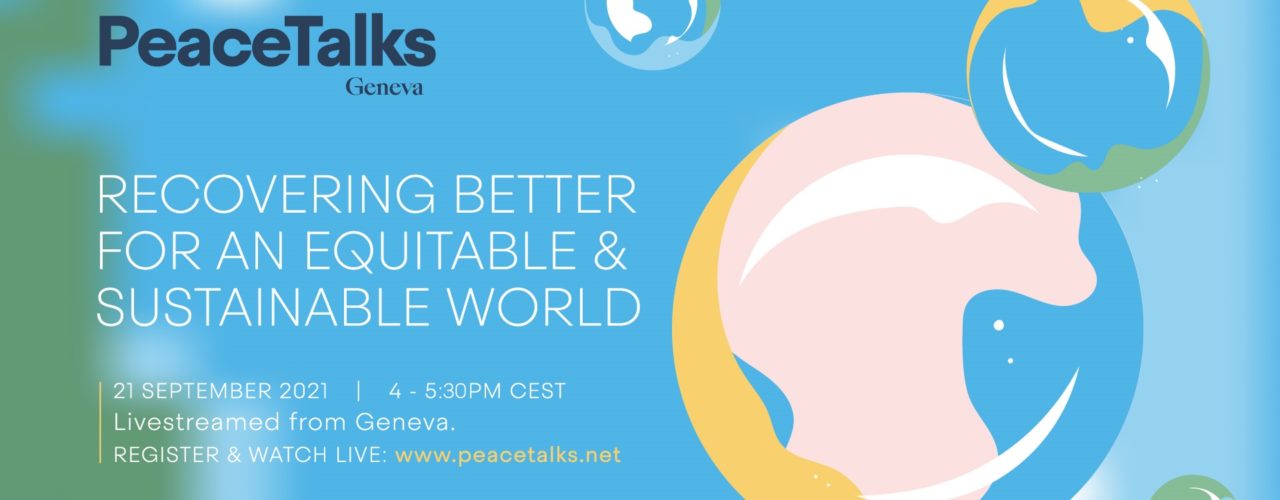[Geneva, 15 Dec 2020] The Principles for Peace, a groundbreaking global and collaborative initiative to develop principles, standards and norms that will guide international, national, and local approaches to building lasting peace is being launched today during a virtual event hosted from Geneva.
The initiative is being spearheaded by a diverse and independent International Commission with deep expertise and experience drawn from current and former political leaders, civil society leaders and some of the world’s foremost practitioners in the fields of international peacemaking and peacebuilding.
The International Commission on Inclusive Peace will address the shortcomings of contemporary approaches to building peace and reframe peacemaking and peacebuilding for the 21st century. The Commission will be supported by the Principles for Peace Secretariat in Geneva, hosted by Interpeace.
There is an urgent need to improve the international approach to peacebuilding and peacemaking. The world is experiencing over 50 active armed conflicts, an all-time high[i]. Two-thirds of those crises are protracted conflicts of 8 years or more. Many peace processes are stalled and even when agreements are struck, peace tends to be short term. Indeed, most peace processes fail on average after only seven years.[ii] Furthermore, 35% of peace agreements are never implemented[iii]. The world is changing fast, and approaches to peacebuilding need to evolve with the times. They must become more accountable to, and inclusive of, populations that are suffering the consequence of failed peace processes.
Hiba Qasas, Head of the Principles for Peace Secretariat: “International approaches to peace processes have largely not changed since the end of the Cold War, yet the fundamental nature of conflict has changed. Too many peace processes have failed to effectively reduce or end violent conflicts let alone build lasting peace, and yet the international community continues to apply the same solutions and expect different results.”
Bert Koenders, Former Minister of Foreign Affairs of the Netherlands & Former United Nations Special Representative to the Secretary General (SRSG) in Côte d’Ivoire and Mali, and member of the International Commissionon Inclusive Peace, speaking on the eve of the launch: “Our current approach to peacemaking is not sufficient. We have to do things differently. We have to move beyond top-down approaches that use the same toolbox that treats every country the same and hoping for the best.”
The work of the International Commission will be anchored in a bottom-up process that engages hundreds of thousands of people with lived experience of conflict and peace processes. The initiative is bolstered by an extensive Stakeholder Forum of international and local organizations committed to building peace around the world. Local consultations in more than 25 conflict affected countries will aim to capture the aspirations for peace from every corner of society. Local voices will inform the Commission’s deliberations to ensure they are grounded and inclusive of marginalized groups.
According to the President of Interpeace, Scott Weber: “Contemporary peace processes are not fit-for-purpose. Bringing hostilities to an end by rewarding those who have been violent with a share of power, is both insufficient and at times counter-productive. Peace processes must focus on building trust, laying the foundations for broadly legitimate institutions and a social contract between citizens and their States.”
The International Commission for Inclusive Peace will conduct global consultations for the next two years at the international, regional, national, and local levels and will be informed by cutting-edge research on lessons learned in peacebuilding and peacemaking from previous peace processes. It will build on the solid foundations and existing political will reflected in the United Nations Sustaining Peace agenda and related Security Council Resolutions.
The initiative is supported by the Governments of Sweden, Denmark, Switzerland, the Netherlands, the Robert Bosch Stiftung and Interpeace. Interpeace is an International Organisation for Peacebuilding that has been leading the development of nationally owned peacebuilding solutions across the world for 26 years.
Members of the International Commission for Inclusive Peace are:
Mr. Bernardo Arévalo de León. Guatemala. Member of the Guatemalan Congress. Senior diplomat. Former Deputy Foreign Minister. Former Deputy Director General at Interpeace for Research and Development. Peacebuilding Expert and Practitioner.
Mr. Yves Daccord. Switzerland. Former Director General of the International Committee of the Red Cross (ICRC). Humanitarian practitioner with experiences in Israel, Palestine, Sudan, Yemen, Chechnya and Georgia. Leading a special initiative at Harvard's Berkman Klein Center for Internet and society, focusing on the theme of security, social contract and the role of cities at the age of digital surveillance and pandemics.
Lieutenant-General (ret) The Honourable Roméo Dallaire. Canada. Former Force Commander of the United Nations Assistance Mission for Rwanda. Former Canadian Senator. Founder of the Dallaire Institute for Children, Peace and Security.
Ms. Ilwad Elman. Somalia/Canada. Peace Activist and leader in Women, Peace and Security Programming in Somalia. Chief Operating Officer and Co-founder of Elman Peace and Human Rights Center. Expert Advisor on Youth, Peace and Security to the United Nations Secretary General.
Mr. Frederic Gateretse Ngoga. Burundi. Ambassador, Head of Conflict Prevention and Early Warning Division at the African Union Commission. Former Senior Officer with the African Union Mission in Somalia (AMISOM).
HRH Prince Ghazi bin Muhammad. Jordan. Chief Adviser for Religious and Cultural Affairs and Personal Envoy to His Majesty. Professor of Philosophy. Active in interfaith dialogue. Former Advisor for Tribal Affairs and Cultural Secretary.
Mr. Bert Koenders. The Netherlands. Former Minister of Foreign Affairs of the Netherlands. Former Minister for Development Cooperation. Former United Nations Secretary General’s Special Representative (SRSG) in Côte d’Ivoire and Mali. Former President of the North Atlantic Treaty Organization (NATO) Parliamentary Assembly.
Ms. Sanam Naraghi Anderlini. Iran/United Kingdom. Founder and Executive Director of the International Civil Society Action Network (ICAN). Director of the Center of Women, Peace and Security at the London School of Economics.
Ms. Teresita Quintos Deles. Philippines. Peacemaker and Civil Society Activist. Party to the Philippines Peace Agreement on the Bangsamoro. Co-Founder, International Center for Innovation, Transformation and Excellence in Governance (INCITEGov). Former Presidential Advisor on the Peace Process in the Philippines.
Ms. Naheed Sarabi. Afghanistan. Former Deputy Minister of Finance. Former Deputy for the Secretariat for Peace Loya Jirga in Afghanistan in 2019. Former Director General for Analysis and Monitoring at Finance Ministry. Former Director of the Afghanistan National Development Strategy.
Mr. Rory Stewart. United Kingdom. Senior Fellow at the Jackson Institute, Yale University, focusing on contemporary politics in crisis and on international development and intervention. Former British diplomat. Development professional and politician. Former Minister of State in the Foreign Office and Former Secretary of State for International Development. Author of four books. Presentation of three documentaries focused on Foreign Policy.
Ms. Annika Söder. Sweden. Ambassador. Former State Secretary for Foreign Affairs of Sweden. President of the Board of Governors European Institute of Peace. Former State Secretary for Development Cooperation and Humanitarian Affairs.
Media Contact for coordinating interviews
Luvini Ranasinghe, Global Communication Manager, Interpeace
ranasinghe@interpeace.org
Mobile: +41 79 475 64 95
Direct Line: +41 22 404 59 22
Notes to the editors
Find more information about:
Register on our website: www.principles4peace.org
[i] Therese Pettersson and Magnus Öberg (2020) Organized violence: 1989–2019, Journal of Peace Research 57:4, 597–613. State-based armed conflicts are defined as “a contested incompatibility that concerns government and/or territory where the use of armed force between two parties, of which at least one is the government of a state, results in at least 25 battle-related deaths in one calendar year”. Non-State conflicts are thereby defined as “the use of armed force between two organised armed groups, neither of which is the government of a state, which results in at least 25 battle-related deaths in a year”.
[ii] PRIO (2016) Conflict Recurrence, PRIO Conflict Trends 02/2016.
[iii] Stina Högbladh (2012) Peace Agreements 1975-2011: Updating the UCDP Peace Agreement Database, in: Pettersson, Therése, Themnér, Lotta (eds) States in Armed Conflict 2011, 39-56.


























